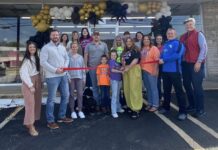COOKEVILLE – When children suffer one or more of the officially recognized adverse childhood experiences, or ACEs, it can cause problems such as developmental delays, behavioral problems and health issues down the road. Over the last few years, researchers have developed tools for those who work with children to use while helping the child to cope with their traumas.
Elizabeth Ramsey, assistant professor of human ecology at Tennessee Tech University, has joined with a group of other community leaders to form the Putnam County Resilience Coalition. Their goal is to raise awareness of trauma-informed care in the community in order to give important education to those who work with children.
“I would go into the school system to talk to principals or to train teachers, and they would say, ‘I’ve got these kids and I know they have adverse childhood experiences. Please, tell me what to do to help them,’” Ramsey said.
The coalition was formed last summer, and in addition to Ramsey, who is the group’s researcher, its members include Kristi Paling, regional coordinator of the Upper Cumberland Council on Children and Youth; John Rust, program coordinator of Power of Putnam; and Jada Campbell, interventionist/mentor at Avery Trace Middle School.
They are finalizing a survey that will be sent to the leaders of community agencies they have identified who regularly work with children in the Upper Cumberland. The survey will help assess the level of training and knowledge of trauma informed-care strategies in individuals in these agencies, and their perceived ability to use these strategies in their work.
The ultimate goal is to identify how the coalition can help these agencies get the knowledge and training they need to help children suffering from their trauma.
“You have some of these children who are like dandelions, who thrive anywhere and can grow and bloom and thrive in the crack of the sidewalk. Then you have those who are like an orchid, that is so hard to get to grow,” Ramsey said. “When I’m teaching about trauma, I always tell my students that it’s in the eye of the beholder. What can be a traumatic experience to one person may not be for another.”
The coalition plans to get the survey out this year and then be able to sort through the results to see where they can help in bringing knowledge of trauma-informed care to agencies around Putnam County.
“I’m hoping to gain some good information, and I think it’ll help us know where to go to prioritize what to work on first,” Ramsey said.
For more information about the coalition, contact Ramsey at eramsey@tntech.edu.









